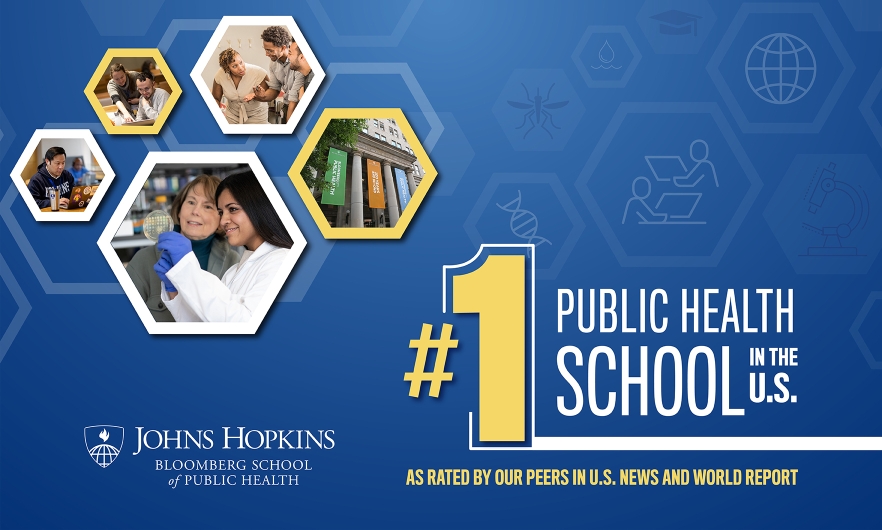Johns Hopkins Bloomberg School of Public Health Again Ranked #1 by Peers in U.S. News & World Report

The Johns Hopkins Bloomberg School of Public Health has again been named the top public health school in the nation by its peer schools and programs, as reported by U.S. News & World Report. The Bloomberg School has held the #1 spot since the rankings began in 1994.
This year’s U.S. News & World Report rankings include 213 public health schools and programs accredited by the Council on Education for Public Health. The U.S. News rankings survey, which is sent to leaders of the accredited schools and programs, is based on a single question about the academic quality of each public health school or program.
“We are proud to be recognized by our peers, and this honor is a reflection on every member of the Bloomberg School community,” said Dean Ellen J. MacKenzie. “Day after day, our people work to meet today’s complex public health challenges with evidence, innovation, and courage. In the past year, we have done crucial work in areas that include aging, planetary health, AI and data science, humanitarian health and the health of Indigenous communities, safe drinking water, gun violence prevention, reproductive health, and gender equity. We are proud of our achievements, but restless to do more, and are committed to finding powerful public health solutions for the many daunting problems we still face.”
For the second year, the rankings include specialty areas within public health. In these rankings, which are also based on peer nominations, the Bloomberg School has been named by peers as leading the fields of:
- #1 Environmental Health Sciences
- #1 Epidemiology
- #1 Health Policy and Management
- #1 Social and Behavioral Sciences
- #2 Biostatistics
Established at Johns Hopkins University more than a century ago, the Bloomberg School is the nation’s oldest and largest school of public health. It currently instructs more than 3,200 students and employs over 1,800 faculty members. With more than $500 million in annual research funding, 28,000-plus alumni, and work in over 120 countries, the School has unique impact and reach.
Here are a few of the School’s highlights from the past year:
- The Bloomberg American Health Initiative continues to lead the way in addressing the most pressing health challenges in the U.S., with 329 Bloomberg Fellows representing 258 collaborating organizations that include law enforcement agencies, libraries, community-based organizations, and local health departments.
- Our Center for Health Security received a $23.5 million award to partner with the CDC on a pioneering new epidemic preparedness project, and we were selected by the U.S. Department of Transportation to lead a new Johns Hopkins Center for Climate-Smart Transportation.
- We launched a new Center for Global Women’s Health and Gender Equity to address key issues including gender-based violence, economic and social empowerment, and equitable norms and health systems.
- The Planetary Health Alliance now has a home at Johns Hopkins, and just this month we announced the launch of a Universitywide Johns Hopkins Institute for Planetary Health that will bring together efforts across disciplines to work at the intersection of human health and the environment.
- We demonstrated that narrower traffic lanes can prevent collisions, uncovered new protective benefits of breast milk, and published an important study on the chemistry of mosquito attraction.
- We remain dedicated to communicating about public health, serving as a trusted source through a wide array of channels including our website, magazine, Expert Insights and Global Health NOW newsletters, social media, videos, and Public Health On Call podcast, and the media.
- We were proud to deliver our self-study for CEPH reaccreditation and to host a committee of reviewers to share more about how we work together across the School to advance public health education, research, and practice.
- This year, we will break ground on a new building that is boldly designed to nurture community and collaboration, foster more research opportunities, and connect us to our neighbors in Baltimore. It will be a vibrant space where community members can work together seamlessly on the most urgent public health challenges.
To learn more about the Bloomberg School, please visit publichealth.jhu.edu.
###
For more information, contact Robin Scullin rsculli1@jhu.edu or Kris Henry khenry39@jhu.edu.
